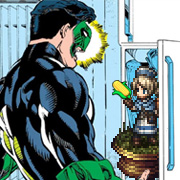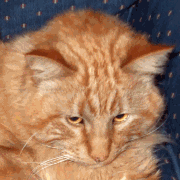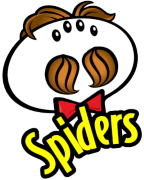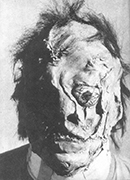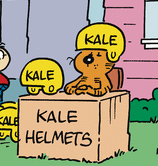|
People who only understand the plot when reading a book are probably the same people who only hear the lyrics when listening to music
|
|
|
|

|
| # ? Jun 3, 2024 15:21 |
|
You guys are tilting at a windmill here.
|
|
|
|
Boing posted:So are you saying that there is capitalist oppression in Oliver Twist, even if the book isn't directly about it; and that it's perfectly reasonable to want to talk about how it comes through in the historical context of the text; and discuss, for example, modern perspectives on trusting in the charity of rich capitalists? That is to say, to expound on the plot, independent of the prose? Capitalism exists in Oliver Twist. It is ultimately responsible for the predicaments of many of its characters. But "capitalist oppression" specifically means the exploitation of the working class's labour by the bourgeoisie, who control the means of production. It doesn't just signify rich people being mean. The working class does not figure into the plot of Oliver Twist. Industry does not make an appearance. The characters are either part of the bourgeoisie or the lumpenproletariat, two non-productive classes. Oliver Twist holds interest due to its caricatured, melodramatic treatment of the extremes of poverty and prosperity. This is all contained within the prose. Thranguy posted:Literature is a subset of storytelling, and all of its specific mechanics are only of interest insofar as they advance that aim. An approach to fiction that ignores story and its elements (character, setting, plot, and sometimes message) is stupidly reductionist, like film critique that ignores acting and screenwriting in favor of focusing entirely on cinematography. No one is denying that plotting contributes to literature. But it is subordinate to prose, just like how acting and screenwriting are subordinate to direction. The medium is the message. BravestOfTheLamps fucked around with this message at 22:42 on Nov 10, 2018 |
|
|
|
BravestOfTheLamps posted:
No, screenwriting and direction are co-equal and only individuals filling both roles can be called auteurs. This is probably also relevant to the matter of written fiction as well.
|
|
|
|
Thranguy posted:No, screenwriting and direction are co-equal and only individuals filling both roles can be called auteurs. This is probably also relevant to the matter of written fiction as well. They aren't. Screenwriting is only one of the components of a movie, which are all contingent on direction. The de-emphasizing of prose is a way for people to avoid discussion for which have they have not educated themselves.
|
|
|
|
Thranguy posted:No, screenwriting and direction are co-equal and only individuals filling both roles can be called auteurs.
|
|
|
|
Sham bam bamina! posted:This is the exact opposite of the auteur theory. Not quite the exact opposite, which would be claiming another role had that primacy or that filmmaking is inextricably collaborative, but yes, I am rejecting that theory.
|
|
|
|
Thranguy posted:Literature is a subset of storytelling, and all of its specific mechanics are only of interest insofar as they advance that aim. An approach to fiction that ignores story and its elements (character, setting, plot, and sometimes message) is stupidly reductionist, like film critique that ignores acting and screenwriting in favor of focusing entirely on cinematography. He's arguing, in his customary trollish way, that because those elements are all conveyed through prose, the mechanics of the prose matter the most. The word choice, the flow, the descriptors, all of it. The film comparison doesn't quite work since not all those elements are made up of the same component parts, words on a page. But in order to accurately criticize prose we'd need to have the text in front of us to pull out specific examples to dissect. We don't and haven't memorized passages so it's no surprise most the discussion revolves around character, setting, plot, etc. Stuff that we can discuss in the abstract without sourcing the particulars. BotL is the odd guy who actually pulls up sections of the text to break down and analyze. Which is fun but a heck of a lot of effort.
|
|
|
|
Boing posted:Genre reading buffoons: Let's discuss the themes of capitalist oppression in Oliver Twist and their relation to contemporary politics, or the absurdity of the Victorian sexual etiquette portrayed in Pride and Prejudice I am intrigued by how someone can so aggressively not understand what people are talking about while simultaneously being so sure they have made a devastating critique
|
|
|
|
Mel Mudkiper posted:I am intrigued by how someone can so aggressively not understand what people are talking about while simultaneously being so sure they have made a devastating critique This thread is a lot more balanced, but BotL has dropped into a bunch of threads saying that we should judge books solely and only on the prose at a sentence level. And it's absurd to reduce literature like that, especially on something polemical like Dickens, so I'm not gonna begrudge people their overreactions.
|
|
|
|
I'm still struck by how Pride and Prejudice satirizes "Victorian sexual etiquette". Mighty prescient on Jane Austen's part!Strom Cuzewon posted:This thread is a lot more balanced, but BotL has dropped into a bunch of threads saying that we should judge books solely and only on the prose at a sentence level. And it's absurd to reduce literature like that, especially on something polemical like Dickens, so I'm not gonna begrudge people their overreactions. The only reason people remember Dickens is because of how his prose works on a sentence to sentence level. No one remembers Dickens's half-thought polemic, they remember that "Oliver Twist has asked for more".
|
|
|
|
Strom Cuzewon posted:This thread is a lot more balanced, but BotL has dropped into a bunch of threads saying that we should judge books solely and only on the prose at a sentence level. And it's absurd to reduce literature like that, especially on something polemical like Dickens, so I'm not gonna begrudge people their overreactions. I mean, I am still trying to get how "themes" is plot, but "literary devices" is prose
|
|
|
|
I feel like I just have an erroneously narrow idea of what "prose" means then. If I were to do an analysis of Dickens I'd say I'd find the most useful stuff by looking at his portrayal of the impoverished classes. And while that might be conveyed by prose (and strengthened by good prose, or weakened by lovely prose) I wouldn't call it the same as the prose. But you would group that into prose, right? I'm just being too reductionist?
|
|
|
|
Strom Cuzewon posted:I feel like I just have an erroneously narrow idea of what "prose" means then. The mistake you are making is believing that these elements are separable from prose. A message has just as much significance in how it is told as in what it says. And its not a matter of simply separating the message from the telling, because they are fundamentally inseparable. I think one of the issues is that your using a relatively limited definition of prose, as in the words in the sentences in the order they are in. Its technically correct, but doesn't allow you to grasp the breadth that prose represents. I prefer to use the term "craft" to "prose" for this reason. Everything from what the text says, to what it focuses on, to how it is told, to how it flows, etc. all falls into this idea of craft/prose.
|
|
|
|
Thranguy posted:Literature is a subset of storytelling, and all of its specific mechanics are only of interest insofar as they advance that aim. extremely cool nouveau roman writer: awfully old fashioned view of the novel you got there, pal. be a shame if something were to happen to it
|
|
|
|
BravestOfTheLamps posted:I'm still struck by how Pride and Prejudice satirizes "Victorian sexual etiquette". Mighty prescient on Jane Austen's part! Yes, yes, it was technically 20 years before actual Victorian times, this means you're right and my point is totally irrelevant Mel Mudkiper posted:The mistake you are making is believing that these elements are separable from prose. A message has just as much significance in how it is told as in what it says. And its not a matter of simply separating the message from the telling, because they are fundamentally inseparable. Ok, so prose is everything and the message is everything. The medium is the message = the everything is the everything. We can all move on now.
|
|
|
|
Boing posted:Yes, yes, it was technically 20 years before actual Victorian times, this means you're right and my point is totally irrelevant Thank you.
|
|
|
|
Boing posted:Yes, yes, it was technically 20 years before actual Victorian times, this means you're right and my point is totally irrelevant Pretty much
|
|
|
BravestOfTheLamps posted:The only reason people remember Dickens is because of how his prose works on a sentence to sentence level. No one remembers Dickens's half-thought polemic, they remember that "Oliver Twist has asked for more". disagree I'd suggest https://www.amazon.com/Charles-Dickens-Last-Great-Men/dp/1432577794 for a good analysis of why Dicken's ideas, themes, mores, personality, etc., all play into why his fiction is great fiction. Technical skill and polish by themselves aren't enough for great literature. Great literature has a spark. Without the spark, craft is just an empty vessel. Hieronymous Alloy fucked around with this message at 01:14 on Nov 11, 2018 |
|
|
|
|
Mel Mudkiper posted:The mistake you are making is believing that these elements are separable from prose. A message has just as much significance in how it is told as in what it says. And its not a matter of simply separating the message from the telling, because they are fundamentally inseparable. Yeah that seems reasonable. Is it not still worthwhile to break it down into say, prose and narrative. Take Le Guin, a very straightforward narrative but with wonderful prose and earnest musings on human nature, vs Agatha Christie, pretty bland on a sentence level, but an absolute master at carefully introducing plot elements to build a mystery. I'd definitely label both of them as craft, but are they not different parts of the craft? If we go too broad on our definition of prose doesn't it make it harder to compare their relative strengths? I'm coming at this from a hard stemlord perspective, so these are probably questions that have already been answered in the field of criticism. I'm halfway through McCluhan, but if there's a primer on criticism you'd recommend I'd definitely give it a go.
|
|
|
|
Hieronymous Alloy posted:disagree Please don't use amazon links as a replacement for discussion.
|
|
|
Strom Cuzewon posted:Yeah that seems reasonable. Formal criticism has kinda gone in a different direction. At the graduate level it's not just about the technical elements (prose style, sentence structure, pacing, etc) but also about the perspective you're analyzing the work from -- i.e., marxist-historical, feminist, etc. Each reader comes to the work with their own viewpoint, so a feminist reading of LeGuin will focus on different elements from a Marxist reading, even for works like The Dispossessed or The Left Hand of Darkness which have explicit marxist and feminist themes.
|
|
|
|
BravestOfTheLamps posted:Please don't use amazon links as a replacement for discussion. Oh, that was just the first link in google. It should be available as a free download and it's by Chesterton, so should be accessible to all and won't be a waste of your time. https://archive.org/details/in.ernet.dli.2015.213771/page/n1 Basically it's a book-length biography of Dickens, by Chesterton, and an explanation of how the sort of person Dickens was, and the experiences he went through in his life, made him the sort of person who could write such great fiction and specifically great fiction of the specific kind that Dickens wrote. Thing is it's Chesterton so it's pretty drat rambling e.g. quote:This is even more true if we look first at that fundamental optimistic feeling about life, which as it has been often and truly said is the main essence of Dickens. If Dickens's optimism had merely been a matter of happy endings, reconciliations, and orange flowers, it would be a mere superficial art or craft. But it would not, as in the case discussed above, be in any way more superficial than the pessimism of the modern episode, or short story, which is an affair of bad endings, disillusionments, and arsenic. The truth about life is that joy and sorrow are mingled in an almost rhythmical alternation like day and night. The whole of optimistic technique consists in the dodge of breaking off the story at dawn, and the whole of pessimistic technique in the art of breaking off the story at dusk. But wherever and whenever mere artists choose to consider the matter ended, the matter is never ended, and trouble and exultation go on in a design larger than any of ours, neither vanishing at all. Beyond our greatest happiness there lie dangers, and after our greatest dangers there remaineth a rest. http://gutenberg.net.au/ebooks13/1300221h.html
|
|
|
|
|
Strom Cuzewon posted:Yeah that seems reasonable. all the le guin prose i've seen has been extremely dull
|
|
|
|
when im made mod only people whove read mcluhan will be allowed to post in this subforum
|
|
|
|
|
A human heart posted:all the le guin prose i've seen has been extremely dull I was just using her as an example, feel free to mentally substitute a better author or append "by strom's low standards"
|
|
|
|
chernobyl kinsman posted:when im made mod only people whove read mcluhan will be allowed to post in this subforum Cool I make the cut!
|
|
|
|
Strom Cuzewon posted:Is it not still worthwhile to break it down into say, prose and narrative. Take Le Guin, a very straightforward narrative but with wonderful prose and earnest musings on human nature, vs Agatha Christie, pretty bland on a sentence level, but an absolute master at carefully introducing plot elements to build a mystery. The target of the thread as a whole is the genre reader who thinks of "prose" as something completely secondary or ornmanetal and has become inured to bad prose through a very limited reading diet.
|
|
|
|
Hieronymous Alloy posted:Basically it's a book-length biography of Dickens, by Chesterton, and an explanation of how the sort of person Dickens was, and the experiences he went through in his life, made him the sort of person who could write such great fiction and specifically great fiction of the specific kind that Dickens wrote. Who the gently caress cares? We're talking about novels, not biographies.
|
|
|
|
And it should go without saying that whenever people defend books on the basis that their plot and characterization make up for the bad prose, the plot and characterization are always terrible.
|
|
|
|
Dickens has great prose. But it's not his sentence structure that makes him Dickens. Having a solid prose style is a learned skill and most intelligent people can pick it up fairly readily, especially if they take a few writing classes and internalize a decent style manual like John Gardner's The Art of Fiction or Strunk and White. But doing that by itself won't make you Dickens. There's a threshold that mere technical craft won't take you past, it requires something more. BravestOfTheLamps posted:Who the gently caress cares? We're talking about novels, not biographies. It's a critical biography, an extended analysis of his novels through the lens of his biography.
|
|
|
|
|
Hieronymous Alloy posted:Dickens has great prose. But it's not his sentence structure that makes him Dickens. Actually, it is.
|
|
|
|
Hang on, Dick Swiveller?
|
|
|
|
dickens.txt ed: http://biblioklept.org/2012/02/07/an-incomplete-list-of-ridiculous-names-in-charles-dickens-novels/
|
|
|
Sham bam bamina! posted:dickens.txt That's just a list of all of Dickens' named characters isn't it
|
|
|
|
|
biographical criticism is stupid. why's everyone in this forum obsessed with ideas from the 19th century like plot and author's personalities being important
|
|
|
|
A human heart posted:biographical criticism is stupid. why's everyone in this forum obsessed with ideas from the 19th century like plot and author's personalities being important The 20th century was a mistake.
|
|
|
|
Sham bam bamina! posted:dickens.txt Kit Nubbles is my favorite Star Wars dude
|
|
|
|
Balzac famously had utter dogshit prose
|
|
|
|

|
| # ? Jun 3, 2024 15:21 |
|
You can't talk about lovely prose without mentioning Theodore "She paused to lean against a tree that was there" Dreiser. Edit: Someone wrote an entire peer-reviewed paper on how bad he was at writing. Sham bam bamina! fucked around with this message at 05:09 on Nov 12, 2018 |
|
|

